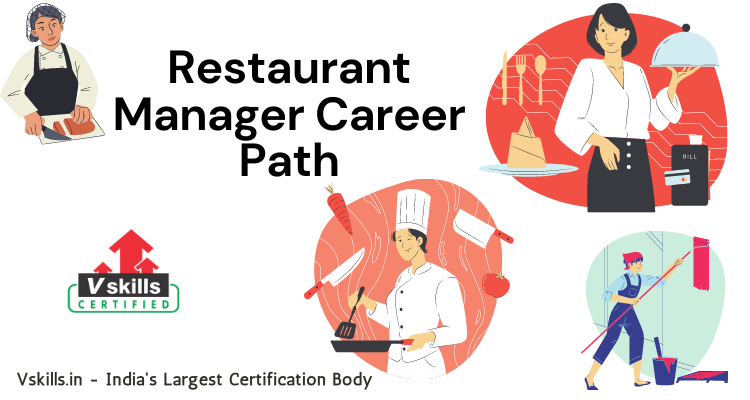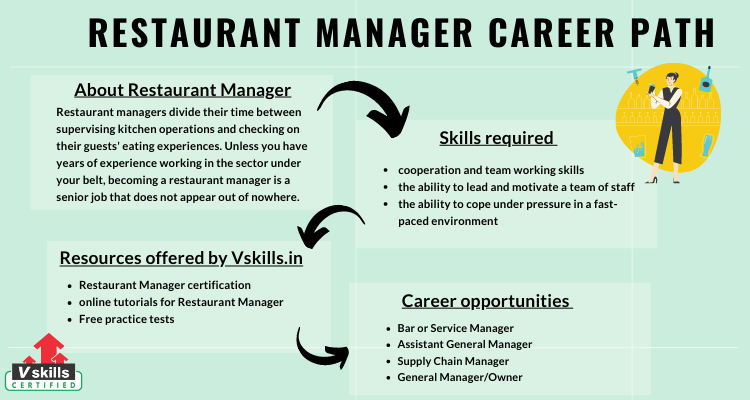Restaurant managers are in charge of the restaurant’s profitability, quality standards, health and safety, as well as employee and customer happiness. The function is both business-like and creative, especially in terms of marketing and business development, since it combines strategic planning and day-to-day management tasks.
Let us look at Restaurant Manager Career Path!
About Restaurant Manager
Restaurant managers divide their time between supervising kitchen operations and checking on their guests’ eating experiences. Unless you have years of experience working in the sector under your belt, becoming a restaurant manager is a senior job that does not appear out of nowhere. Restaurant managers are known to work longer hours than usual, especially on weekends and holidays. They are also in charge of hiring new employees and planning for the future growth of their businesses.
Roles and Responsibilities
From managing employees, keeping the customers happy, to supervising the operations, a restaurant manager has lot of roles to perform. There are various other responsibilities of a restaurant manager:
- Firstly, Restaurant managers have to coordinate daily Front of the House and Back of the House restaurant operations
- Secondly, they have to deliver superior service and maximize customer satisfaction
- Thirdly, respond efficiently and accurately to customer complaints
- Also, regularly review product quality and research new vendors
- Moreover, organize and supervise shifts and train new and current employees on proper customer service practices
- Further, appraise staff performance and provide feedback to improve productivity
- Furthermore, ensure compliance with sanitation and safety regulations
- Additionally, they have to manage restaurant’s good image and suggest ways to improve it
Eligibility
Restaurant management can be pursued in a variety of ways, and applicants with a combination of practical experience, good interpersonal skills, and a commercial understanding are welcome to apply. It is feasible to train on the job and work your way up to the position of restaurant manager without needing a degree or HND.
A degree is required for entry into a graduate recruitment plan, though. Large restaurants and fast food franchises are more likely to provide graduate training programmes. The following graduation degrees or subjects may be beneficial:
- Management or business degree or a diploma
- Management of a hotel degree
- Diploma in catering a hotel
Career options
Bar or Service Manager
You’ll be able to advance to higher-level positions like Bar Manager or Service Manager once you’ve mastered the restaurant positions and functions. In these positions, you’ll be in charge of leading small teams of employees, coaching and training them, as well as handling opening and closing tasks to ensure the restaurant runs well.
Assistant General Manager
The next level after Bar/Service Manager is to take over as Assistant General Manager. It’s common at this level to be paid on a salary rather on an hourly basis. Benefits are frequently offered at this level of management. The hours are long as a result of the trade-off. In the mornings, you’ll be the first to arrive, and the last to leave at night. You’re also gaining the upper-level managerial skills you’ll need to open your own restaurant eventually.
Supply Chain Manager
Restaurant managers are responsible for ensuring that their establishments are properly stocked and supplied. Those who appreciate this aspect of the job may want to look into becoming a supply chain manager. In franchised restaurants, these professionals are common. Supply chain managers are generally in charge of their companies’ purchasing activities. They make certain that inventory is accurate and well-maintained. A bachelor’s degree and several years of restaurant and purchasing experience are often required for this position.
General Manager/Owner
This is usually the restaurant’s top position. In all business decisions, you have the last say. You’re in charge of ensuring the company’s success. You are in charge of all employees. You can still advance higher than GM if you work for a corporation. If you work for a small firm, this may be the greatest salary you may obtain before taking the next step of starting your own company.
Working hours
Weekly working hours are usually in excess of 40 hours. Many restaurant managers work nights, weekends, and late evenings. Shift work is very frequent, as is working on holidays. In some jobs, overtime may be required, and it’s critical to be willing to labour until the job is finished, no matter how long it takes.
Average Salary of Restaurant Manager
- Restaurant managers in fine dining often earn between £22,000 and £40,000 per year.
- Managers of casual dining restaurants can expect to earn between £20,000 and £30,000 per year.
- Managers of fast food restaurants often earn between £18,000 and £30,000 per year.
Salaries vary depending on where you work, who you work for, and what type of business you work for. Boutique restaurants and high-end brasseries, for example, have slightly higher salaries than themed or branded eateries.
Market Demand
Some restaurant brands have formal work experience programmes, which you can typically find information about on their websites. It’s also feasible to get part-time, weekend, or summer jobs in restaurants, allowing you to build experience while you study or apply for jobs. Kitchen, waiting, or bar work in restaurants, cafés, and hotels, as well as catering or customer service employment, are all examples of relevant experience.
As a seasoned restaurant manager, you may be able to advance your career by moving to a larger or more prestigious establishment. There are also potential to advance into area management roles, which need in-depth knowledge of a specific chain as well as substantial practical experience. Depending on the size of the restaurants, an area manager may be in charge of four to six. You could potentially advance to a position in operations management or corporate headquarters. If you don’t want to take on the role of area manager, you could shift to other locations, possibly within the same chain, or relocate to manage a failing or underperforming linked business.
Resources for Restaurant Manager
Before you can become an expert in desired areas, you must first build a solid base. Before you can move on to practical teaching, you’ll need to have the right applied skills. To gain a full understanding of the domain, you can use the following tools:
- Firstly, Online Tutorials for Restaurant Manager
- Online trainings and webinars for Restaurant Manager
- Also, Certification Courses from verified sources such as Vskills, Coursera, Udemy and so on.
- In addition, Online communities
- Moreover, Blogs and study material from experts in this field and many more.
Here are some examples of how you can improve your abilities:
- Freelancing
- Internships
- Apprenticeship programs
The above steps will help you to get this domain started. It’s a long way to go, however. You can take an advanced course to reach a new level of skills.
Some resources offered by Vskills
Vskills offer Restaurant Manager certification for all those interested in working in this field. This certification course covers the following topics –
- Indian Food Retail Scenario
- Customer relationship
- Communication skills
- Stress Management
- Time Management
- Job Ethics
Vskills also offers free practice tests and online tutorials to supplement the learning process. You can check them by clicking on the following links –
Discover the career opportunities and other prospects of career as Restaurant Manager. Hurry up and start preparing now with Vskills.in!




